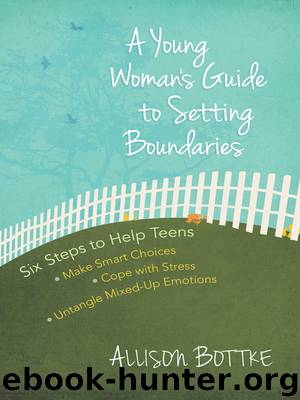A Young Woman's Guide to Setting Boundaries by Allison Bottke

Author:Allison Bottke
Language: eng
Format: epub
ISBN: 9780736956703
Publisher: Harvest House Publishers, Inc.
Six Steps to SANITY
S—Stop Ignoring Your Pain and Problems
A—Assemble Supportive People
N—Nip Excuses in the Bud
I—Implement a Plan of Action
T—Trust the Voice of the Spirit
Y—Yield Everything to God
in•san•i•ty
/in 'sanitē/
n: doing the same thing and expecting different results
Visit our Facebook community just for you at Facebook.com/SanitySupportforYoungWomen
SettingBoundariesBooks.com
11
Under the Dome of Pressure
How do you feel when you’re stressed? Most of us get tense—physically and emotionally. We normally feel stressed when we’re threatened or anxious. Some stress can be helpful (as when we’re preparing for graduation). But it can also be unhelpful (as when it keeps us from effectively dealing with traumatic events or situations).
Everyone experiences stress at times—adults, teens, and children. Stress can motivate you to develop the skills you need to cope with and adapt to new and potentially threatening situations. However, the beneficial aspects of stress diminish when it is severe enough to overwhelm your ability to take care of yourself. You’re severely stressed when a cyberbully attacks you on Facebook and makes life so awful that you start to do drugs or sneak alcohol before going to school so you can face your peers.
Sometimes after a traumatic event that is especially frightening, you might have a strong and lingering reaction. You may experience powerful and painful emotions, jitters, sadness, or depression after an overwhelming situation.
The fact is, horrible things are happening all around you, yet many folks expect you to bounce back and be resilient simply because you’re young. However, the reactions from stressful events can be significant and life changing. Have any of your problems resulted in any of these?
• disbelief, shock, and numbness
• feeling sad, frustrated, and helpless
• fear and anxiety about the future
• feeling guilty
• anger, tension, and irritability
• difficulty concentrating and making decisions
• crying
• reduced interest in usual activities
• wanting to be alone
• loss of appetite—or increase in appetite
• sleeping too much or too little
• nightmares or bad memories
• reoccurring thoughts of the event
• headaches, back pains, and stomach problems
• increased heart rate, difficulty breathing
• smoking or use of alcohol or drugs
Are you feeling any of these reactions to negative stress? By using healthy ways to cope and by getting the right care and support, you can put problems in perspective and begin to feel the stressful feelings and symptoms subside. However, this is easier said than done in many cases. If not addressed properly, one reaction can become a series of reactions that can lead to seemingly unmanageable pressure. That can sometimes lead to devastating results.
Extreme Stress
Most teens today know of someone who has committed suicide. Suicide is the third-leading cause of death for youth between the ages of 10 and 24. It results in approximately 4600 lives lost each year.1
Understandably, many adults are fearful to address this topic. Some people can’t comprehend what it’s like to feel utterly hopeless—to be so damaged by past or current events that you’re too afraid and too tired to even go on, and so opting out of the future seems to be the best thing to do.
If this describes you, please don’t give up.
Download
This site does not store any files on its server. We only index and link to content provided by other sites. Please contact the content providers to delete copyright contents if any and email us, we'll remove relevant links or contents immediately.
God by Aslan Reza(1644)
God's Smuggler by Brother Andrew(1549)
Chicken Soup for the Teenage Soul on Tough Stuff by Jack Canfield(1519)
Chicken Soup for the Teenage Soul III by Jack Canfield(1393)
The Case for Christ: A Journalist's Personal Investigation of the Evidence for Jesus (Case for ... Series) by Lee Strobel(1315)
The Manual to Manhood by Jonathan Catherman(1239)
Greyson Gray by B.C. Tweedt(1229)
One-Minute Prayers™ for Young Women by Hope Lyda(1167)
Right on Track by Sanya Richards-Ross(1154)
Unsinkable by Jessica Long(1131)
NIV Revolution by Zondervan(1130)
The Spirit of Prayer by William Law(1097)
Invisible by Jennifer Rothschild(1086)
The Nazi Hunters by Neal Bascomb(1040)
Friends without Benefits by Ron Luce(1025)
Grace, Gold, and Glory: My Leap of Faith by Gabrielle Douglas & Michelle Burford(1020)
Chicken Soup for the Teenage Soul Letters by Jack Canfield(1012)
Islamic History: A Very Short Introduction by Adam J. Silverstein(1008)
Rubicon by B.C. Tweedt(996)
